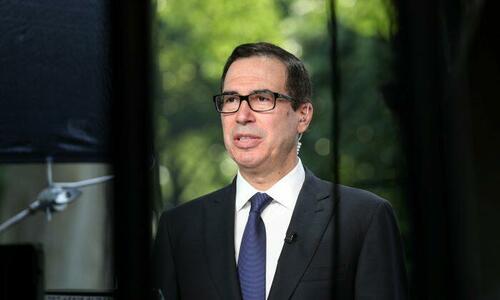
Authored by Bryan Jung via The Epoch Times,
Former U.S. Treasury Secretary Steven Mnuchin has called the Group of Seven’s plan to place a price cap on Russian oil “ridiculous.”
The veteran cabinet member from the Trump administration was speaking with CNBC’s Hadley Gamble on a panel at the Milken Institute’s Middle East and Africa Summit.
In addition to being a former Goldman Sachs partner, Mnuchin now works in private equity investing.
Mnuchin panned the proposal to cap prices as “not only not feasible, I think it’s the most ridiculous idea I’ve ever heard.”
He explained that that imposing sanctions on Russia and its officials now would have far less of an impact than if they were implemented before the war started.
“Sanctions would have had a big impact back then. I think the problem now is that there’s limited options … there’s parts of the world that are now buying Russian oil outside of U.S. sanctions,” Mnuchin said.
“But look, a price cap, the market is going to set the price. So if you put sanctions on at higher prices, in a way, you’re just making the situation worse, in my opinion.”
The G7, which includes the United States, Canada, France, Germany, Italy, Japan, and the United Kingdom, are trying to set a fixed price cap on Russian oil from Dec. 5. Australia will also participate.
Meanwhile, American and European officials are still trying to decide upon the exact cap level, which has delayed the implementation of the plan.
The price caps, which were first proposed in July, would restrict shipping-related services that involve oil, including maritime transport, insurance, and financing to buyers of Russian oil supplies, unless it was sold at or below the limit.
The scheme is intended to hurt Russia financially, while protecting Western businesses and households from the effect of skyrocketing energy prices.
G7 Continue Stepping Up Sanctions on Kremlin
The United States and its allies have repeated that they are fully committed to rolling out more sanctions on Russia due to the Kremlin’s invasion of Ukraine.
Additional sanctions by the European Union will also take effect in early December and will terminate Russian crude oil deliveries to the bloc by sea, in time for a ban on all refined energy imports from Moscow next year.
The EU is imposing the energy sanctions in solidarity with President Volodymyr Zelensky’s government in Kyiv, despite the hardship it will cause on already suffering European residents and businesses.
The Kremlin has been pressed to look for new customers in Asia, and has since boosted its oil exports to countries like India and China, as it loses its main export base in Europe.
However, analysts have said that the price cap plan will not work without cooperation from the Asian nations, which both have strong ties with Moscow.
If the Indians and Chinese agreed to follow the price caps, American policymakers anticipate a relaxation in global oil prices, while hitting Russian oil export revenues where it hurts.
The United States said that it has no problem with India still buying oil from Russia, as long as it agrees to abide by the G7 price caps, Treasury Secretary Janet Yellen said, while visiting her counterparts in New Delhi last week.
Indian energy companies “can also purchase oil at any price they want as long as they don’t use these Western services and they find other services. And either way is fine,” Yellen told Reuters.
The Russians have threatened retaliatory measures against any country that imposes price caps on its energy exports and will terminate oil shipments to them.
Peace Negotiations Long Overdue
It currently looks uncertain that the two Asian giants would even go along with the proposed price caps, due to major political and economic factors.
Mnuchin stated that negotiations between Moscow and Kyiv were “long overdue,” and that the best case scenario to avoid an escalating crisis for now would be a truce between both combatants.
Ukraine has repeatedly expressed it will only enter negotiations following the “restoration of Ukraine’s territorial integrity,” financial reparations, and the handing over of Russian soldiers and officials for alleged war crimes.
The Russians have outright rejected those offers.
A spokesman for Russian President Vladimir Putin’s government said on Nov. 18, that “one thing is for sure: the Ukrainians do not want any negotiations,” CNBC reported.
Biden Administration Should Push For Energy Self-Sufficiency
Mnuchin also criticized President Joe Biden for having an “extreme focus on the issue of global warming.”
He said that while he was “not minimizing” climate change, he stated that the White House should not “discourage investment in the carbon economy.”
“With approvals, and again this stuff doesn’t need legislation, there are things the current administration could do, you know, there’s a need for pipeline, there’s a need for infrastructure, there’s a need for more drilling,” Mnuchin said.
He then stated that cheap and secure domestic energy supplies still remain critical to U.S. national security interests.
Mnuchin called for a return to the years of energy self-sufficiency under his former boss, President Donald Trump, and blasted Biden for hypocritically complaining about insufficient oil supplies from exporting nations.
“We can’t turn around and say to OPEC+, ‘Why are you not producing more oil?’ when we’re not doing it ourselves,” the former treasury secretary said.
“There’s plenty of shale oil and at these numbers, it’s very economic to produce,” he said, while noting that the U.S. energy sector was being “starved of capital.”
Mnuchin said that when he was still Treasury Secretary, he wanted to acquire more funding to fill up the National Petroleum Reserve, when prices were still low in the first months of the pandemic.
That oil reserve since has been severely depleted by a decision of the Biden administration to tap it in order to lower U.S. gas prices.
Authored by Bryan Jung via The Epoch Times,
Former U.S. Treasury Secretary Steven Mnuchin has called the Group of Seven’s plan to place a price cap on Russian oil “ridiculous.”
The veteran cabinet member from the Trump administration was speaking with CNBC’s Hadley Gamble on a panel at the Milken Institute’s Middle East and Africa Summit.
In addition to being a former Goldman Sachs partner, Mnuchin now works in private equity investing.
Mnuchin panned the proposal to cap prices as “not only not feasible, I think it’s the most ridiculous idea I’ve ever heard.”
He explained that that imposing sanctions on Russia and its officials now would have far less of an impact than if they were implemented before the war started.
“Sanctions would have had a big impact back then. I think the problem now is that there’s limited options … there’s parts of the world that are now buying Russian oil outside of U.S. sanctions,” Mnuchin said.
“But look, a price cap, the market is going to set the price. So if you put sanctions on at higher prices, in a way, you’re just making the situation worse, in my opinion.”
The G7, which includes the United States, Canada, France, Germany, Italy, Japan, and the United Kingdom, are trying to set a fixed price cap on Russian oil from Dec. 5. Australia will also participate.
Meanwhile, American and European officials are still trying to decide upon the exact cap level, which has delayed the implementation of the plan.
The price caps, which were first proposed in July, would restrict shipping-related services that involve oil, including maritime transport, insurance, and financing to buyers of Russian oil supplies, unless it was sold at or below the limit.
The scheme is intended to hurt Russia financially, while protecting Western businesses and households from the effect of skyrocketing energy prices.
G7 Continue Stepping Up Sanctions on Kremlin
The United States and its allies have repeated that they are fully committed to rolling out more sanctions on Russia due to the Kremlin’s invasion of Ukraine.
Additional sanctions by the European Union will also take effect in early December and will terminate Russian crude oil deliveries to the bloc by sea, in time for a ban on all refined energy imports from Moscow next year.
The EU is imposing the energy sanctions in solidarity with President Volodymyr Zelensky’s government in Kyiv, despite the hardship it will cause on already suffering European residents and businesses.
The Kremlin has been pressed to look for new customers in Asia, and has since boosted its oil exports to countries like India and China, as it loses its main export base in Europe.
However, analysts have said that the price cap plan will not work without cooperation from the Asian nations, which both have strong ties with Moscow.
If the Indians and Chinese agreed to follow the price caps, American policymakers anticipate a relaxation in global oil prices, while hitting Russian oil export revenues where it hurts.
The United States said that it has no problem with India still buying oil from Russia, as long as it agrees to abide by the G7 price caps, Treasury Secretary Janet Yellen said, while visiting her counterparts in New Delhi last week.
Indian energy companies “can also purchase oil at any price they want as long as they don’t use these Western services and they find other services. And either way is fine,” Yellen told Reuters.
The Russians have threatened retaliatory measures against any country that imposes price caps on its energy exports and will terminate oil shipments to them.
Peace Negotiations Long Overdue
It currently looks uncertain that the two Asian giants would even go along with the proposed price caps, due to major political and economic factors.
Mnuchin stated that negotiations between Moscow and Kyiv were “long overdue,” and that the best case scenario to avoid an escalating crisis for now would be a truce between both combatants.
Ukraine has repeatedly expressed it will only enter negotiations following the “restoration of Ukraine’s territorial integrity,” financial reparations, and the handing over of Russian soldiers and officials for alleged war crimes.
The Russians have outright rejected those offers.
A spokesman for Russian President Vladimir Putin’s government said on Nov. 18, that “one thing is for sure: the Ukrainians do not want any negotiations,” CNBC reported.
Biden Administration Should Push For Energy Self-Sufficiency
Mnuchin also criticized President Joe Biden for having an “extreme focus on the issue of global warming.”
He said that while he was “not minimizing” climate change, he stated that the White House should not “discourage investment in the carbon economy.”
“With approvals, and again this stuff doesn’t need legislation, there are things the current administration could do, you know, there’s a need for pipeline, there’s a need for infrastructure, there’s a need for more drilling,” Mnuchin said.
He then stated that cheap and secure domestic energy supplies still remain critical to U.S. national security interests.
Mnuchin called for a return to the years of energy self-sufficiency under his former boss, President Donald Trump, and blasted Biden for hypocritically complaining about insufficient oil supplies from exporting nations.
“We can’t turn around and say to OPEC+, ‘Why are you not producing more oil?’ when we’re not doing it ourselves,” the former treasury secretary said.
“There’s plenty of shale oil and at these numbers, it’s very economic to produce,” he said, while noting that the U.S. energy sector was being “starved of capital.”
Mnuchin said that when he was still Treasury Secretary, he wanted to acquire more funding to fill up the National Petroleum Reserve, when prices were still low in the first months of the pandemic.
That oil reserve since has been severely depleted by a decision of the Biden administration to tap it in order to lower U.S. gas prices.






